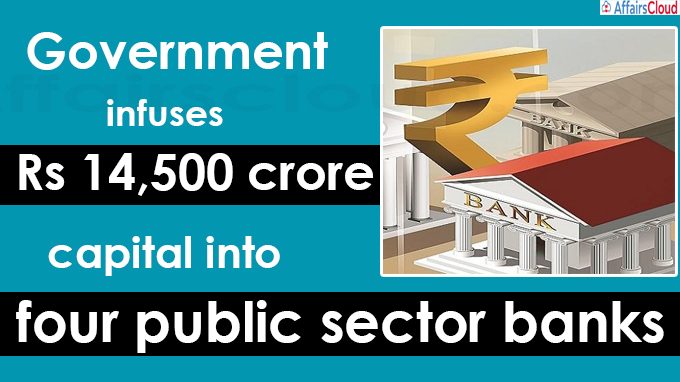 On March 31, 2021, The Government of India(GOI) has infused Rs 14,500 crore ($1.98 billion) in four weak Public Sector Banks (PSBs) by issuing them non-interest-bearing Zero-Coupon Recapitalisation Bonds with maturities between March 31, 2031, and March 31, 2036.
On March 31, 2021, The Government of India(GOI) has infused Rs 14,500 crore ($1.98 billion) in four weak Public Sector Banks (PSBs) by issuing them non-interest-bearing Zero-Coupon Recapitalisation Bonds with maturities between March 31, 2031, and March 31, 2036.
- Out of the total amount infused the Central Bank of India was provided with Rs 4,800 crore, Indian Overseas Bank (IOB) with 4,100 crores, Bank of India with Rs 3,000 crore and UCO Bank with Rs 2,600 crore.
- For FY22, the government had allocated Rs 20,000 crore for capital infusion into the public sector banks for meeting regulatory requirements.
- The government has allocated Rs 5,500 crore to Punjab and Sind Bank (P&SB) in Q3FY21.
Background:
- Since the government is the biggest shareholder in PSBs, it has the responsibility to maintain the capital reserves in it (Based on Reserve Bank of India’s(RBI)norms of Capital Adequacy Ratio (CAR) of 12%).
- Hence the government will infuse capital through recapitalisation bonds into PSBs which are facing capital shortages.
- Out of four banks, IOB, Central Bank of India and UCO Bank are currently under RBI’s prompt corrective action (PCA) framework, which puts several restrictions related to lending, management compensation and directors’ fees.
- The current capital infusion by the GOI is aimed to help these banks to come out of the PCA framework.
Key points:
- This infusion is from the remaining budgetary allocation for FY21.
- The date of issuance will be the date on which the subscription amount is received from these PSBs. PSBs would hold these securities in their investment portfolio under the held-to-maturity category.
- GoI had infused Rs 2.5 trillion over FY18-FY20. While before FY18, the government would do a direct infusion of equity in PSBs, from FY18 onwards the government has used recapitalisation bonds.
About Zero Recapitalisation Bond:
What are Recapitalisation Bonds?
- These are the bonds issued to banks by GOI in the form of equity capital to increase the bank’s capital reserves.
Zero-Coupon Recapitalisation Bond:
- It is a bond that is non-tradable and non-transferable which will be limited only to a specific bank for a specified period.
- This bond has no coupon (i.e. zero coupons) and it will be issued at par value rather than the discounted value.
- The Zero Coupon bonds generally come with a maturity period of 10 to 15 years.
- Under this bond, the amount has to be paid back by the bank at the end of the specified maturity period and the government would then again use the funds raised to infuse back in PSBs as equity.
- This bond will be held at the Held-To-Maturity (HTM) category of the bank as per the RBI guidelines.
Note – Coupon is the Interest/Returns which the Investor gets on a bond.
Note – The term issued at par means the bond will be issued at face value. A bond Par value is static and it will be assigned at the time when the security is issued.
Other types of Issuance:
When a company issues a bond and if it receives the face value of the security the bond is said to have been issued at par. If the issuer receives less than the face value for the security, it is issued at a discount. If the issuer receives more than the face value for the security, it is issued at a premium.
Recent Related News:
In a first of its kind move, Central Government has issued Rs 5,500 crore in zero-coupon bonds to recapitalise Punjab and Sind Bank (P&SB) by allowing it to park the paper in its held-to-maturity (HTM) category at face value rather than the discounted market rate. This move of capital infusion was approved by the Ministry of Finance on November 10, 2020.




